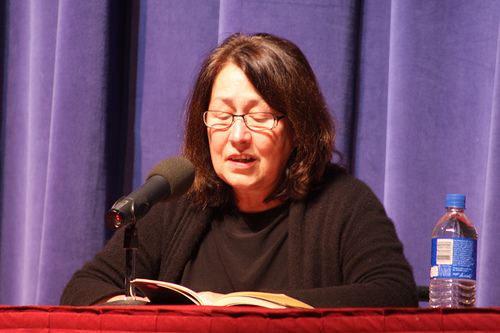One Art
BY PROF. VAROL AKMAN
Dara Wier (b. 1949)
By the second book I was an abstraction maniac. I wanted to be as abstract as possible.
Dara Wier is the author of numerous collections of poetry, including "Selected Poems" (2009), "Remnants of Hannah" (2006), "Reverse Rapture" (2005), "Hat On a Pond" (2002), "Voyages in English" (2001), "Our Master Plan" (1999), "Blue for the Plough" (1992) and "The Book of Knowledge" (1988). About "Reverse Rapture," John Ashbery has said: "It may not be for the faint of heart -- most intense experiences aren't -- but those who stay with it will find themselves face to face with a world whose eerily sharp focus suggests recent satellite photographs of Mars. And they will never be the same again."
Wier was born in New Orleans, Louisiana. She graduated from Longwood College (1971) and received her MFA degree from Bowling Green University (1974). Her poetry has been supported by the Guggenheim Foundation, the National Endowment for the Arts and the Massachusetts Cultural Council. Professor Wier teaches workshops and directs the MFA program for poets and writers at the University of Massachusetts-Amherst.
Wier's work has appeared in Boston Review, The Nation, The New Republic, The Denver Quarterly, New England Review and The Massachusetts Review, among other publications. Recent volumes of "Best American Poetry" and "The Pushcart Prize" anthology have also included her verse. For poems featured in The American Poetry Review, she was honored with the 2001 Jerome J. Shestack Poetry Prize.
"Colorless green ideas sleep furiously" is a sentence that was invented by Noam Chomsky in his 1955 dissertation "Logical Structures of Linguistic Theory" as an example of something grammatically acceptable yet absurd. Maybe so, but this week's beautiful terrible sic poem is an exception. As if by way of explication, in another piece ("Attitude of Rags") Wier writes:
It felt like a story sorry it'd lost all its sentences,
Like a sentence looking for its syntax.
All of the words had homeless, unemployed, orphan
Written all over their faces.
> Sometimes a poem begins with a sensation, sometimes with a word, sometimes a combination of words, sometimes with a phrase, sometimes with a line, sometimes with a title, sometimes with a tone, sometimes with a sound, sometimes because I'm grieving or pissed or remote or estranged or one with the universe, sometimes because to write a poem is all I want to be doing.
> If there are any theoretical concerns behind, or inside my writing, I try to keep these unknown, ignored, better left unsaid. … If a theory has at its center something originally forceful, I enjoy following its logic. I'd never consciously apply any of that logic to something I'm writing within a poem.
> But I truly believe one should write one poem at a time. One story. One novel (that's a crazy thought). I remember reading about Emerson having a lazy-Susan sort of desk built for himself on which he kept his several on-going projects going, a desk he could swirl around before him as he wished to work on different pieces of writing. I thought that was funny.
> Imagination is something that you're supposedly able to own yourself. It's your imagination. If anybody starts telling you what you should be imagining or what would be appropriate or good or just to imagine, or necessary or required to imagine, you better be suspicious of that.
NOTES
- "The Terrible Poem" is from Conduit (2009) and is reprinted here with the author's permission. The excerpts also appear courtesy of the poet. The first two are from a 2008 interview for Rob McLennan's blog. The third one is from a 2008 interview by Alisha Allston for Superstition Review. The last one is from a 2010 conversation with Cynthia Arrieu-King for Jacket Magazine.
- Wier is a master of whimsical titles. You can read the following poems by typing the author's name in the search window of the Bilkent Library website: "In the Braids Were the Birds Who Lived in Two-Story Condos," "The Logic of Parallel Parking," "I Like Aluminum Foil for It Has No Emotions," "95% of All Thoroughbred Horses Descend from Eclipse."
- Wier is married to poet James Tate, winner of the 1992 Pulitzer Prize in Poetry for his "Selected Poems." Tate's numerous honors include the Wallace Stevens Award from the Academy of American Poets.
The Terrible Poem
Love lives just sit there on the sidelines.
I've never told a soul what it is I believe.
Things never will never stop getting stop more stop long stop, ago.
Everything material in theory is able to cast a shadow.
Everything's shadow is a different shade of black with violent overtones.
If someone says a sheep is nothing but a big box of mittens
I don't think it will enable me to sleep better tomorrow.
The girl placed a cocoon in a glass jar too small for what emerged.
I placed a hermit crab near by, next to, a fire.
We look for something beautiful and do unmendable damage.
I have a clear memory of something I'm sure hasn't happened.
It'll take a while to drag the freaks away from their cribs.
Hey baby, say a while will you while will you while will you.
That is our lullaby, that is our unnamable anthem, you are catgut.